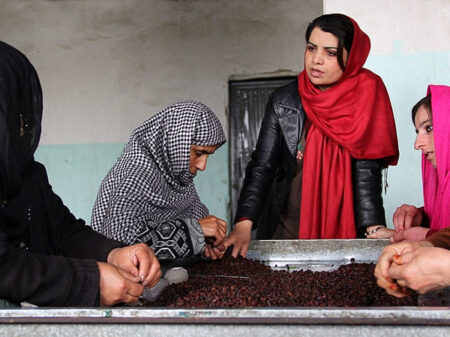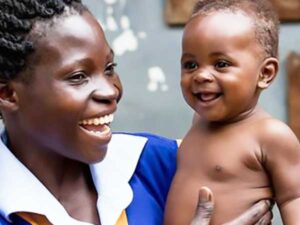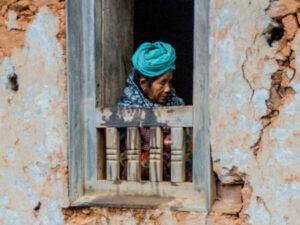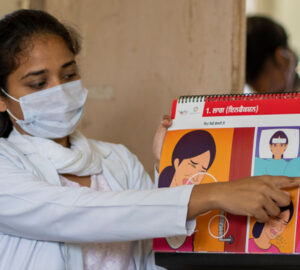
Interview with Andrew Kassoy (B Lab)
B Lab manages the standards and certification process for B corps, meaning companies that have committed to principles of stakeholder
Roots of Peace supports farmers in reclaiming their livelihoods after war. The organization works with international partners to remove land mines in post-conflict regions, and then helps farmers cultivate and sell high-value crops.
Heidi Kuhn of Roots of Peace spoke with Erica Edwards on February 16, 2023. Click here to read the full conversation with insights highlighted.
Erica Edwards: Could you introduce yourself and describe the problem you’re addressing and
how you’re responding to it?
Heidi Kuhn: My name is Heidi Kuhn. I’m founder and CEO of Roots of Peace, a humanitarian
non-profit that began 25 years ago with a vision of turning mines to vines, replacing the scourge
of landmines with bountiful vineyards in orchards worldwide.
The problem that I’m addressing is that we live in a world where there’s an estimated 60 million
landmines silently poised in 60 countries. The world can see now in Ukraine, in a year’s time, over
30% of Ukraine is now contaminated by landmines in a country that was once known as the
breadbasket of Europe. Roots of Peace, 25 years ago, set out on a quest to replace these
minefields with bountiful agricultural crops.
We began in Croatia and we’ve seen Croatia transform from 1.2 million landmines to one of the
top tourist destinations in the world and that was due in partnership with the California Vintners,
Miljenko Grgich, Mike Grgich, who was born there and turns a 100 years young next month. He
worked with me and flew to Croatia where we visited places and saw the devastation from the
Balkan War.
After 9/11, we moved to Afghanistan where grapes, of course, are never fermented with due
respect to the Muslim culture. But again, Afghanistan is a country that’s 80% dependent upon
agriculture for jobs. It was once known as the Garden of Central Asia. But conversely, it’s the most
heavily mined country in the world. Our job with Roots of Peace is to bring the farmers back to
cultivate peace through agriculture, to reclaim the one earth that we share, to put the seeds of
hope into the ground, to empower and train the farmers, to grow these high value crops. The
pomegranates in Kandahar, the apples and apricots and almonds in Ghazni, Wardak, Logar. North
of Kabul, it’s fresh grapes. Cherries in Badakhshan, beautiful saffron in Herat, and Roots of Peace
is currently working in Afghanistan despite the Taliban’s very strict restrictions upon women.
Erica Edwards: What makes your approach distinctive?
Heidi Kuhn: Our approach is distinctive because we reclaim the land after the landmines have
been removed. The farmers have lost the knowledge transferred from grandfather to father to
son, how to work the land. So we go back into post-conflict areas and train the farmers to grow
high value crops, to provide the exports to new markets. In the case of Guatemala, a former war
torn land, we are bringing the farmers literally back home. We’re getting to the root cause of
out-migration, so many of the refugees coming to the borders. Nobody chooses to do that. It’s
only because the farmers in the northern triangle of Guatemala, El Salvador, Nicaragua cannot
earn a living and we are providing alternative agricultural crops such as coffee and onions and
beautiful crops, avocados, where the farmers can earn a living and they don’t have to send their
sons and daughters to the border.
This is a solution that is unique. Again, getting to the root cause of out-migration and planting the
roots of peace all over the world. This literally can change the face of the earth as we remove the
seeds of destruction and hatred that intentionally have been planted into the one earth that we’ve
been given to shepherd and to remove these seeds of hatred and to literally plant the seeds of
love as represented by the fruits that we have been given to grow for thousands and thousands of
years. It is time to plant the roots of peace on earth and it is doable by turning swords into
plowshares, guns into shovels, and mines into vines.
Erica Edwards: Heidi, can you describe the process of finding landmines? How do you guys do
that?
Heidi Kuhn: Roots of Peace partners with international professional organizations to do
demining. Roots of Peace raises the awareness and the funds as the first part of the value chain
to de-mine, replant, and rebuild economies. We have raised the funds to remove millions of
landmines, UXOs around the world, but Roots of Peace’s forte is going in afterwards. We go in and
train the farmers. We planted over 7 million fruit trees in Afghanistan and impacted the lives of
over 1 million farmers and families.
When we go into these areas, how do we do it? We go in and assess the highest value crop. What
is the soil content? What are the weather conditions? What are the Appalachians that grow the
best crops that will be the most highest value to the farmer so that they can feed their families,
have income and send their daughters and sons for education? And then, afterwards, we identify
the markets. Where are these markets best sold? So for instance, in Afghanistan, we did research
and brought the Afghan traders to Dubai, brought them to Mumbai, to Delhi, and introduced them
to buyers and the beautiful pomegranates and melons and fresh fruits are then exported to these
neighboring countries and the money goes back to the farmers. So again, they have the dignity
and ability to cultivate peace through agriculture. When people are desperate, they go to the gun.
This is how the devastation has happened but when they can find the dignity to return to the earth
to feed their families, you’re going to choose that shovel rather than the gun.
Erica Edwards: Is there any example that you cherish about how Roots of Peace has
significantly impacted a village or a farmer? What’s your proudest impact?
Heidi Kuhn: Oh, I have so many. I think the proudest impact that I have right now is the fact that
women are being marginalized in Afghanistan. As a woman led CEO of an American NGO to have
the ability today to go into this planting season with pride to not have given up like so many others
who have had to do, NGOs have gone away. Now, more than ever, we need to stay with the
farmers and people of Afghanistan and I’m very proud as a woman CEO, as a mother, and as a
grandmother, to stand in solidarity with the Afghan men and especially, the women. They need us
right now. Nature doesn’t wait for peace treaties to be signed. We are on the advent of a spring
planting season like never before and we are going to get as many fruit trees into the ground so
that sustainable peace through agriculture is possible in these war torn lands.
We’ll pivot. We’ll go into Ukraine. Tragically, 30% of the land is mined. Again, when our colleagues
get those mines out, Roots of Peace will be on the ground with teams of shovels, training farmers,
and getting the fruits of the earth back into the land. I’m so proud we’ve worked in Angola, these
areas where the beautiful lush fruits and in Huambo the pineapples, the strawberries are held
hostage to the remnants of war.
Angola is a country that could feed all of sub-Saharan Africa but first, we have to get to the root
cause. We’ve got to get these seeds of hatred out of not only the soil but the soul. Take the hatred
out of the earth, the hatred from our minds, the hatred in our hearts, and literally plant the roots of
peace, plant the love beyond the politics. We have to fill our minds, our hearts, our spirits with love
and return to the good earth that we share.
The other proudest moment that I have, because I grew up in the 1970s, I went to UC Berkeley
and that was the peace movement. The Vietnam War was raging and we saw a more peaceful
world in our teenage years. Today, in Vietnam, 80% of the land in Quảng Trị Province, the former
battlefields of the Vietnam War, are still contaminated by the cluster munitions and explosive
remnants of war. I’m so proud in my adult life to return to Vietnam and for the past 12 years, my
own son, Tucker Kuhn, went there as a graduate of the USF and took the leadership to work with
the Vietnamese government to train over 10,000 farmers to grow black pepper on the former
battlefields.
So I guess when you asked me, the proudest moment that I have is that my son, Tucker Kuhn, is
now the executive director of Roots of Peace and a vision that I started 25 years ago when he was
barely a teenager. To see him grow, to witness how his mother can work with his father and a
family dedicated to peace and have that generational wisdom passed on, that leadership for
peace and to know that peace is possible in the one earth that we share.
Erica Edwards: What insights or teachable lessons can be taken from your work that others
could use?
Heidi Kuhn: We can take the models of working in some of the hardest neighborhoods in the
world, for instance Afghanistan, and ripple that across borders into Syria to grow the Aleppo
Pepper, into Turkey right now where the land has been devastated by the earthquakes. This is a
business model for peace. Roots of Peace is pioneering the economics of peace. Peace, in my
day, two fingers up. It needs to be taken seriously and we need to go back to the earth to heal the
wounds of war, what has been intentionally put into the earth and left behind, and we need to
mobilize our sources around the world. Again, with shovels, not guns and restore the one earth
that we share. As we plant a tree, it also is creating carbon credits and it’s affecting climate
change. It’s an environmental issue and I think when we bring people back to their land, give them
jobs and dignity to cultivate their land, they can see hope for a future generation to truly live with
sustainable peace through agriculture.
Erica Edwards: What advice would you give someone who’s interested in replicating what
you’ve accomplished through Roots of Peace?
Heidi Kuhn: My best advice is to work with the local farmers, to listen to them, to listen to their
needs, and to work with the farmers to do the agricultural assessments required to go into these
areas to determine the highest value crop, to provide the training necessary for the farmers within
the most remote villages, and then replicate that through the district, through the region, through
the country, and into neighboring countries.
The business model that we’ve created in Vietnam can be replicated in Laos, in Cambodia, and we
can take on Southeast Asia and remove the remnants of war and empower the farmers in these
regions to grow some of the best spices and crops in the world that not only will benefit and feed
their families, but provide money through exports to new markets.
One of the best examples that we have in Vietnam is the black pepper that we have cultivated
from the former battlefields of the Vietnam War are now being sold to Morton & Bassett Spice
Company in the United States. Every single bottle on the back has the Roots of Peace logo to
remind people to create business models for peace, to give back to the land, and that, to me, is a
taste of peace.
Erica Edwards: Every social innovator learns as much from things that don’t work as things that
do. Can you describe something that you tried that didn’t work, that taught you an important
lesson? Ideally something that others could learn from.
Heidi Kuhn: That didn’t work? Sure. Again, I think you have to listen to people when you go into a
foreign country and you can’t go in with an American idea and necessarily think it’s going to work
in another country. When we first went into Afghanistan, we worked in the Shomali Plains north of
Kabul and we introduced what in the Napa, Sonoma Valley are trellis grapevines, the grapes are
grown on mounds and we introduced the wooden trellises.
We asked the farmers in 2003, in those very early days, to not touch them, to let them grow and
we’ll be back in the spring. Well, when we returned in the spring, they had cut all the wooden trellis
posts down and we looked at them and said, “Why? Why didn’t you listen to us?” with tears in my
eyes. Their response was, “Mrs. Kuhn, it was the coldest winter on record. If we didn’t use that
wood to make fires, to feed our families, and to keep ourselves warm, we would’ve died.” So they
introduced, working with us, the cement trellis posts and this is a business model that is
replicated all throughout Afghanistan, the cement trellis posts because this was a mistake that we
made but we listened, we learned, and we improved and we went forward.
Erica Edwards: Almost every social innovator faces the challenge of raising sufficient funding
for their work but aside from funding, are there any challenges that you have faced or are
currently facing that you haven’t yet been able to overcome or solve?
Heidi Kuhn: Being an NGO, a non-governmental organization working in Afghanistan and around
the world is the most challenging because the government grants that we have been entrusted
with, you can only take a very small amount for overhead. We are still, 25 years later, trying to find
creative grounded solutions to provide the operational funding to keep the headquarters
sustained and growing and creating an endowment and showing the business models that we
have developed and again, I guess, getting the world to listen and to invest in peace.
We can do this. We’ve done it. We’ll continue to do it. But I would like to see Roots of Peace much
more sustainable so that we would have an endowment, that we would have a fund so that when
these crisis situations occur, that we will be here 100 years from now. It wasn’t just a comet that
went across the sky and people say, “Wow, wasn’t that bright? Wasn’t it wonderful?” and then it
burns out. I think a business model for Roots of Peace deserves, 100 years from now, to be solid,
to be improving the lives of farmers and families around the world, feeding their children and
walking the land without fear.
Erica Edwards: Are you working to advance system level change in your field? If so, how
specifically are you doing that?
Heidi Kuhn: Roots of Peace is affecting system level change right at the ground zero.
[Prior to] August 15th when the Taliban took over Afghanistan, there were around 250 NGOs, [now]
less than 10 remain. Roots of Peace is one of the only organizations right now allowed to work in
Afghanistan and chooses to work in Afghanistan. I’m very proud of that. If we were to give up right
now, millions of people would suffer and we’re not giving up. We are going the distance and we
are standing in solidarity with the farmers as one of the few organizations working in Afghanistan
today.
It’s a pretty big deal. I mean, we just finished a conversation with USAID a few minutes ago and
they’re just amazed that we’ve had the courage to do this because most people have chosen to
give up out of fear. And we’ve, in the middle of the night, had those thoughts, “What if we do pull
out?” and it’s not an option. It’s not an option for Roots at Peace. After the Taliban took over in
August 2021, we were faced with a very serious decision. Do we pull out like the other 250 NGOs
or do we go the distance? The fruit that we have trained the farmers to cultivate in the field was
ripe. Nature doesn’t wait for peace treaties to be signed. If we had walked away, the fruit would’ve
rotted in the fields and the confidence that the Taliban would have in an American NGO, especially
led by a woman, would fall.
Roots of Peace chose to go the distance. It’s been one of the hardest year and a half of my
professional career to lead Roots of Peace through the unknown, through the many challenges,
through the many restrictions that are increasingly happening in Afghanistan. We don’t know
what’s going to happen tomorrow but I do know one thing, Roots of Peace will not give up on the
Afghan people, especially the women. This is a time for women to lead in Afghanistan, to show
the substance that we are made of. We are women of substance and we must show that to the
Afghan women who are feeding their families and desperately relying upon the continued
investment by the international community. $3.5 billion right now are frozen because of the de
facto regime that exists in Afghanistan today, but to further punish the Afghan people by giving up
would buy into the wrong message. With courage and with faith in the future, Roots of Peace,
again, chooses to lead with a shovel and not the sword.
Erica Edwards: What do you think is most needed from actors or partners to advance system
level change?
Heidi Kuhn: To advance system level change, we need investment. This is a business of peace
and the financial investment that is needed for the social entrepreneurs should not be us walking
around with canisters begging for pennies for peace. When we are able to show a model that is
successful, we need serious investment so that we can scale it and we can leverage it. We need
investment in operational funding which is always so slim, so that we can hire the professionals
that are needed to grow an organization in marketing, in public relations, and mainly in storytelling
because we never hear stories of good things happening in Afghanistan.
I’ve got multiple stories to share with you and on a weekly basis, I speak to all of our Afghan
women staff members from various provinces in Kandahar, in Helmand, in Nangarhar, in Farah,
and these women are desperate and so grateful that we have not given up on them. They have
families who are dependent upon them. Right now, they’re working from inside their homes
because of the strict restrictions made by the Taliban and especially targeting NGOs that are
employing women. We’re finding workarounds, how we can create online trainings for the women
while they are forced to stay home right now, are forced to wear burkas, and have a mahram. A
mahram is a brother or a husband escorting the women when they walk out of the front door of
their home.
When we do bring our Afghan women to the field, we make sure that they, at all times, have the
hijab over their head, they have a mahram available to escort them. We work within the rules that
are outlined, as strict as they are, to get the job done. Very proudly, today, Roots of Peace, I
manage as a CEO, $85 million under contract in Afghanistan, $30 million from USAID, and $55
million from INL, International Narcotics and Law Enforcement, and I still, from Roots of Peace
Headquarters, manage over 400 employees. If there was a challenge to be had, it’s the operational
funding that is required at headquarters to continue these programs, to grow them under the
guidelines of a nonprofit organization.
Erica Edwards: How do you see your work evolving over the next five years?
Heidi Kuhn: Well, sadly, I see a greater demand. I think as we look at Ukraine, we see the need for
the same business model to be replicated there. We will have to go back there and restore areas
such as Mykolaiv. In Ukraine, I’m currently working with the farmers there through our contacts
with Rotary and restoring beautiful vineyards and agricultural land that the farmers and vintners
are now on the frontline fighting for their country. Once the guns of war have silenced, Roots of
Peace must go back in there and restore the livelihoods, train the farmers, make the land fertile
once again because as we’re watching as global citizens in technicolor, the hatred, the bombs, the
devastation of the earth that is fertile for agriculture, it’s fertile for peace.
Erica Edwards: Is there anything that we didn’t cover that you feel is important for people to
know about Roots of Peace?
Heidi Kuhn: That peace is possible from the ground up. I believe in the power of love over the
power of hate. Every day, it’s going to win. It may be darkest before the dawn but don’t curse the
darkness, light a candle. That’s generational wisdom that my grandmother taught me and let
there be peace on earth and let it begin with me.
Click here to read the full conversation with insights highlighted.
Erica J. Edwards is a multimedia journalist based in NYC. She has worked at New York Public Radio, WTAE, WMUR, and the Mayor’s Office of Media and Entertainment (MOME). Edwards was a LEDE Fellow within the Solutions Journalism Network. She is deeply passionate about bringing solutions journalism to the forefront of the public’s news diet through social media.
* This interview has been edited and condensed.
Learn about other organizations that provide social innovations in post-conflict regions.


B Lab manages the standards and certification process for B corps, meaning companies that have committed to principles of stakeholder

The Equis Institute provides grants and other support that invests in new and innovative ways to increase the civic participation

Mothers2mothers employs women living with HIV as community health workers called Mentor Mothers. These Mentor Mothers work both at health

The Resolution Project supports young leaders in developing their skills and launching social ventures. George Tsiatis of Resolution Project spoke

Well-built housing can be the difference between life and death in an earthquake or other disaster. Build Change supports homeowners

Noora Health’s Care Companion Program (CCP) trains nurses to deliver actionable health information to the families of hospital patients on